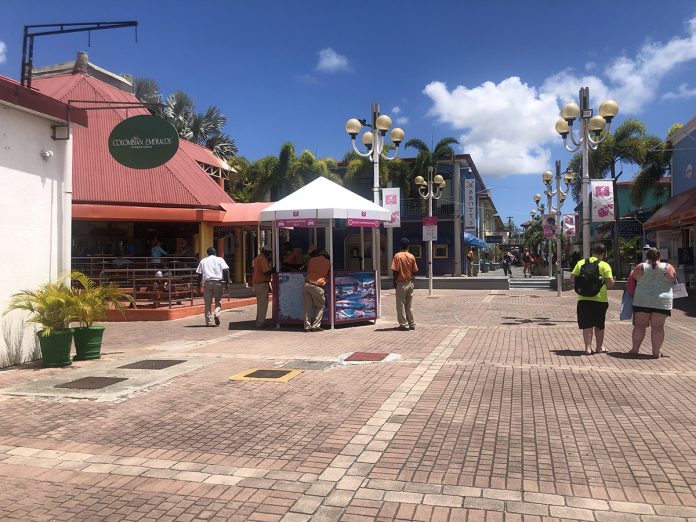
Story and photos by Orville Williams
If they agree on one thing, both tourists and vendors who participate in the local cruise tourism sector, it is that things are significantly different than they were a year or two ago, in more ways than one.
A walk-through of Heritage Quay on Wednesday afternoon revealed a buzzing scene, with dozens of tourists who disembarked from the cruise ships patronising the shops in and around the quay.
Most persons were getting their grub at the food service areas, while others ventured in and out of the souvenir shops, the craft market and even the chairs strategically placed outdoors in the shade, where local artists worked speedily to capture memories through drawings and paintings on the spot.
Despite the relaxation of the mandatory mask-wearing mandate last week, two out of every four visitors still wore their masks, and even encouraged their fellow travellers on some occasions to do likewise.
“I know they’re no longer forcing us to wear masks here in Antigua, but it’s a good practice, especially when you’re in a crowd.
“You can never know who is sick and can pass the virus on to you, and you may be infected without knowing and pass it on to someone else.
“So, even though a lot of us tourists act like it’s the end of the world when we’re told to wear masks, it only makes sense, and if you’re a good person who cares about others, why wouldn’t you make that sacrifice?” one tourist told Observer, with her adult daughter nodding in agreement.
Regarding the locals present, the majority of taxi drivers, craft vendors, artists and cruise port personnel also wore their masks, removing them for brief moments to take a drink or speak more clearly to someone in conversation.
Some vendors explained that, while they remain a bit cautious with the removal of mask-wearing rules, it has been having a positive impact on their business.
“To be honest, before – when they were still forcing everyone to wear masks – many of the visitors would stay on the ships, I guess in a form of protest. But in the past couple of days, I’ve been seeing more and more visitors coming into the [craft] market.
“They wear their masks when dealing with me directly, but they remove them once they’re finished and heading back out. I respect that, to be fair, because I’ve seen how hostile and selfish some people can be with respect to the mask-wearing,” Denise explained.
Speaking of hostility, a handful of tourists expressed concerns about their interactions with some taxi drivers, who were apparently overzealous in looking to solicit their business.
“It was a bit scary when we left the ship, because a group of taxi drivers immediately surrounded us and were all shouting – I couldn’t even hear myself thinking.
“I know they’re trying to do their jobs, but they have to remember that we’re not from here and we aren’t necessarily used to that,” one tourist named Carol shared.
That issue has been prevalent in many tourism-dependent Caribbean countries, and is not limited to taxi drivers, but has been a complaint against many other locals involved in the tourism industry.
While many of these situations are innocent – meaning the locals are just trying to get as much business as possible done – in other instances, the tourists almost face abuse for refusing to ‘spend di money’ they are traditionally expected to.
Carol’s husband, who didn’t wish to share his name, responded to Observer’s attempts to reassure his wife, saying, “Well, just like they’ve been waiting for two years for tourists to come and to spend money, we’ve been waiting for the same time to travel and enjoy ourselves, not to get bombarded”.
A group of taxi drivers, who appeared to have a more streamlined process of approaching the tourists, admitted that some of their colleagues were being a bit forceful in their approach, but insisted that, “it’s hard to tell a man what to do when he has been hungry for so long, you have to understand that”.
They added, “Think about when there were no ships coming in; can you imagine how hard it was on us? Now that opportunities are here, you can’t fault some people for trying to scrape as much as they can.”
And some tourists are trying to prevent that type of desperation, and are expressing genuine empathy with the situation.
“I’ve been travelling to Antigua for at least 20 years and it’s a joy to be able to come back after the pandemic messed everything up. I have friends here, so I don’t always have to spend a lot when I visit, but I’m making an effort this time to spend to help the locals bounce back from what I’m assuming has been a very hard time,” one tourist named Heather said.
“I mean, I didn’t need this hat or these sunglasses,” she said, pointing to her shopping bags, “but somebody here is going to benefit from it, so it’s fine.”
Those kind-hearted statements will certainly be well received by the many locals who not only enjoy their interactions with the tourists, but depend on those interactions to earn and put food on their tables.
This has become especially challenging throughout the course of the pandemic, but 50-year-old craft vendor, Monica, is optimistic that the economic rebound will drastically improve sooner, rather than later.
“I don’t think it’s going to be too long before we see things pick up in a big way. It’s not that things are terrible now, because they’re much better than this time last year, but we know how good it can be and was before Covid.
“Once the Covid situation is under control globally, we’ll see a lot more tourists. We’ll also see some of the [supply chain] issues resolved, so we can get more materials in to support our business, so I’m holding on until then,” she said.
